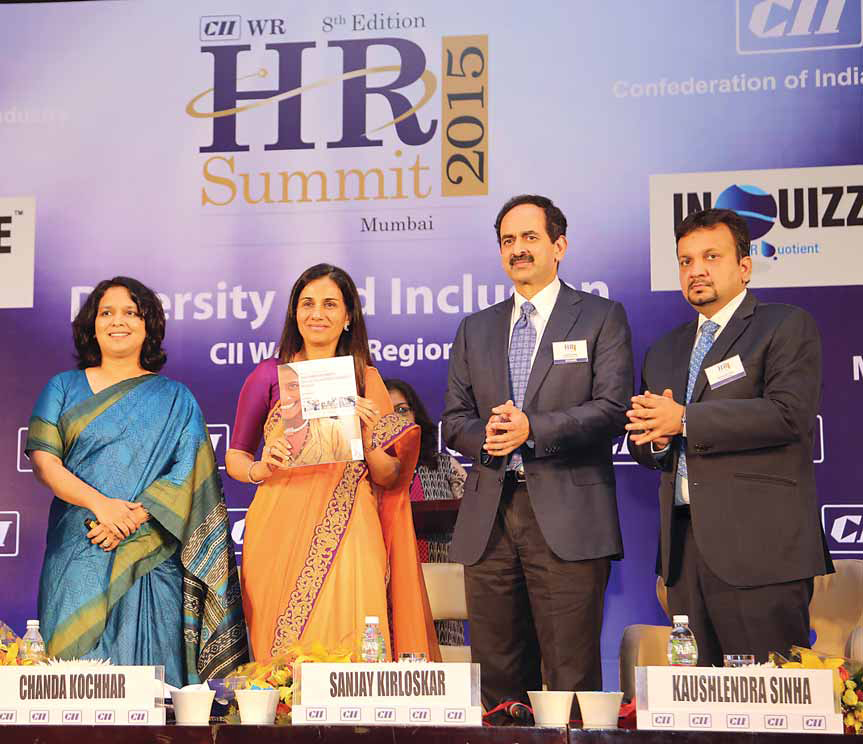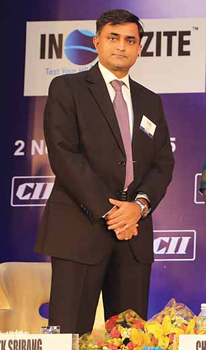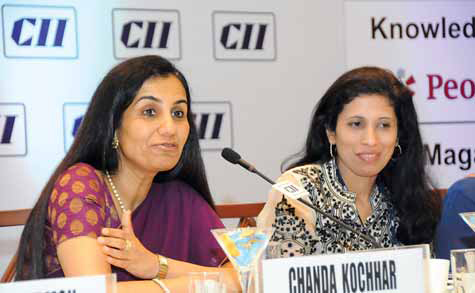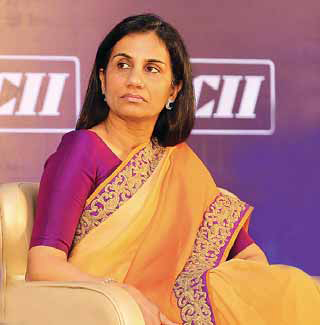Issue No.21 / January 1-15,2015

Chanda Kochhar, Managing Director and Chief Executive Officer at ICICI Bank Limited is widely recognized for her role in shaping the retail banking sector in India and for her leadership at the ICICI Group. She is also known for her contribution to various forums across India and overseas. She was conferred with the Padma Bhushan, one of the India’s highest civilian honours, in 2011.
Kochhar began her career with ICICI Limited in 1984 and was elevated to the Board of Directors of ICICI Bank in 2001. She was instrumental in establishing ICICI Bank during the 1990s, and subsequently headed the infrastructure finance and corporate banking business. In 2000, she took on the challenge of building the nascent banking business, with strong focus on technology, innovation, process reengineering and expansion of distribution and scale. The bank achieved a leadership position during 2006-2007. Kochhar successfully led the bank’s corporate and international banking business during a period of heighted activity and global expansion by Indian companies. From 2007 to 2009, she was the Joint Managing Director and Chief Financial Officer, which was a critical period of rapid change in the global financial landscape. She was later elevated as Managing Director and CEO of ICICI Bank and is now responsible for the bank’s diverse operations in India and overseas. She also chairs the boards of the bank’s principal subsidiaries.
Kochhar is currently the President of the International Monetary Conference,an organisation that annually brings together the chief executives of approximately 70 of the world’s largest financial institutions from 30 countries, along with officials from government institutions. She is also the Deputy Chairperson of the Indian Banks Association. She is on the boards of the Indian Council for Research on International Economic Relations, National Institute of Securities Markets and Institute of International Finance. She has been a member of the Prime Minister’s Council on Trade and High-Level Committee on financing infrastructure. She was also co-chair of the World Economic Forum’s annual meeting in 2001.
As a chief guest at the eighth HR Summit, hosted by CII Western Region, recently in Mumbai, Kochhar took a closer look on the topic of ‘Diversity and Inclusion’ in India and shared her perspective in her address.

Happy to see more men in the audience than expected, to hear the discussion on gender diversity, Kochhar explained that the topic is much more than gender. “It is also about different social backgrounds, abilities and age groups as well. The way India is moving and more young people are coming in the age group, one cannot think about diversity without considering age group factor,” she said.
Kochhar noted that gender diversity is a very important topic for a lot of economic reasons. She said, “If we increase the participation of women in the economy, we will see that our Gross Domestic Product (GDP) will grow up substantially. Recent statistics shows that women contribute 17 per cent of the GDP in India. However, if you look at the global average, women seem to contribute much more to the global GDPs. So, India has to cover a big distance in terms of getting women to participate in economic activity, if we are to take up GDP of the country. Today, women form the 50 percent of the population and for a growing country like India, can we afford to ignore 50 percent of this potential workforce and the talent that is available? For the country to move forward somebody has to set-up their role agenda.” The third thing she added was that diversity of any kind makes the decision making more competent in any company.
Kochhar pointed out that to have all types of diversities including the gender diversity, ensures decisions are comprehensive and wholesome, as they are looked at from many different perspectives. As 50 per cent of consumers also comprise of women, she said, “It is important we have as much diversity in our decision making, while we create our product and services best suited for our consumers.”
Taking stock of corporate India’s growth in the last 30 years, Kochhar said that India has moved a long way. “When I started my career there were very few companies which we could even aspire to join as women because there were many companies where we were not even welcomed. Today, India has evolved a lot from that stage.
Today, we have woman CEO’s in India across various sectors, with banking sector setting an example of its own standard.”
Kochhar gave examples of how women are seen in leading positions across FMCG, pharmaceuticals, IT, consulting and various other companies, spanning across public and private sectors. She spoke about how they are taking up leadership roles in the government sector, whether its top diplomats or positions in finance, taxation regulatory bodies and so on. “Though these are signs of progress, we have to ensure the changes are deep enough and women workforce working in corporate India, proportionately represents them as part of the population. I believe that a percentage of job ready women, who are not joining the organised sector, are joining the so-called unorganised workforce or in some way productively involved and not sitting quietly,” she said.
Meanwhile, talking about woman empowerment, Kochhar is of the view that it’s more about their social empowerment, status in the society and their ability to participate. She says, “Even in rural areas women are getting more independent; women are wanting to get their identity and participation in the workforce. But, that’s only one part of the story, we have to do lot more in increasing the literacy rate among rural women.” For the country to move forward and become a world leader, she stressed that it is not the job of only one segment of the society, but the entire eco-system has to work to make it happen. Which include the government, education system, corporate, society and women themselves. She added that the government is taking various initiatives to support women’s aspirations and protect them from gender bias.
" If we increase the participation of women in the economy, we will see that our GDP will grow up substantially. Recent statistics shows that women contribute 17 percent of the GDP in India. However, if you look at the global average, women seem to contribute much more to the global GDPs "

Coming to education, Kochhar pointed out that as we keep moving up the education ladder, the percentage of women involvement starts dropping. She said, “We need to recognise education as a very important factor. We have to make sure that girls get education, for them to participate in the economy in some form or the other. If you have an educated woman, she would ensure that her daughter gets education, create her career and so on. The multiplying impact of getting young girls educated is tremendous and we have to recognise that as a country.” She also said that we do everything to bring down the ratio of girl dropouts in schools and colleges, that there is proper hygiene, toilets in schools, toilets that are working and clean, and that basic hygiene is encouraged and discussed in school and does not become a taboo.
As we move on to colleges, Kochhar insisted that we have to change the social mindset again that girls are more fit for the marketing stream than sciences. “Now this is again not to undermine the importance sciences, but it is more to say that we need to take this biases from our mind, I think girls are equally capable and intelligent to pursue any stream which they like to pursue. It should be their choice as to what they are interested in,” she said. The MBA entrance exams, Kochhar said, are so quantitative-oriented that it keeps out more and more women from joining the MBA classes. She insisted on making them more all-rounded, to see more participation of women in these courses.
"Women have to believe they can have a career and a family life. They have to decide that they can do both and then should back it up with their commitment. They have to give their job what it takes, in terms of working for hours, in terms of travel or whatever. It’s not just about working hard at the workplace but it’s all about deciding to work hard in life. They will be able to manage both work and family, only with hard work and determination "
On the importance of imparting vocational training to young girls, Kochhar talked about how ICICI Bank has taken a big initiative of imparting vocational training among girls by setting up skill development centres across India. She said, “Almost 25,000 youth that we have trained every year, 40 per cent of them are young girls that come from remote villages.”
At ICICI Bank, she said, more than thirty percent of hiring is of young girls and this is without having any quota system. At ICICI Manipal Academy which is their talent pipeline for hiring entry level managing roles, she said the proportion of girls joining is about thirty five percent.
“It is important for corporates to take a conscious effort to ensure that they pick people on merit and there are enough number of women coming there. But, of course, once you have taken in women it’s also important to create an environment that allows women to grow and in my view, the most important ingredient of that environment is to create a merit-oriented gender-neutral environment,” said Kochhar.
She further added that we just ensure all women get responsibilities, positions, jobs, that they are capable of and based on their performance. “Not with the biases that women cannot do this job or women will not be able to manage family life and work together; if we keep merit-oriented gender-neutral environment that just allows women to flourish and grow in an organisation,” she said.
Corporates do need to recognise the needs of women employees at different stages of her life. More than often, women decide to drop-out once they start their family. “It is important for organisations to make the work environment as conducive as possible. We have a lots of policies for women colleagues whether it is much longer maternity leave, whether its child care leave whether its fertility leave and so on. At this time it becomes very important to ensure that women do not fall off from the working population at that stage,” she said.
We have a lots of policies for women colleagues, whether it is longer maternity leave, whether it is child care leave, whether it is fertility leave and so on. At that time it becomes very important to ensure that women do not fall off from the working population at that stage

Talking about the safety and security of working women, Kochhar said that it is a very important issue that India is presently facing. She talked about the mobile app ‘I-Travel Safe’ that ICICI has created for its women employees. “It is an application, which creates a robust security ecosystem for women and ensures their security. We have dedicated that App to India and want to make it available for any company that wants to take,” she said.
About the social change in the mind set, Kochhar said that we see more acceptance of women to have their identity, for women to participate in the economic life cycle and to create a life that is more productive.
In this context, she said that it is a new trend that is emerging in India, which will have transformational impact on how we can treat gender diversity and economic activity. “That is the new digital India, creating different opportunities and reshaping our society. Digital India has made information and social, economical connectivity available to all, including women. That just opens up lots of opportunities to women to be able to manage their careers in different phases. These opportunities are leading to so called cottage entrepreneurship that’s enabling more and more women to participate in the workforce and become a productive employee,” she said.
In her final statement, Kochhar said that none of the initiatives will help unless women themselves decide, they want all this to work. She stressed that women have to believe in their capabilities; they have to believe that they are as good to do job as good to pursue career as any other male in their family or their organisation. The belief in their capabilities, she said has to come from themselves. “Women have to believe they can have a career and a family life. They have to decide that they can do both and then should back it up with their commitment.They have to give their job what it takes, in terms of working for hours, in terms of travel or whatever. It’s not just about working hard at the work-place but it’s all about deciding to work hard in life. They will be able to manage both work and family,only with hard work, determination and time management. India does not have an organised support system but what India has is a lot of family and social support system, which does not exist in any other country,” she added.
Kochhar ended her address saying that we should keep moving forward and set a benchmark for others to follow. India, as a country, as a society, sets many benchmarks which the world follows.
By Shantanu Relekar